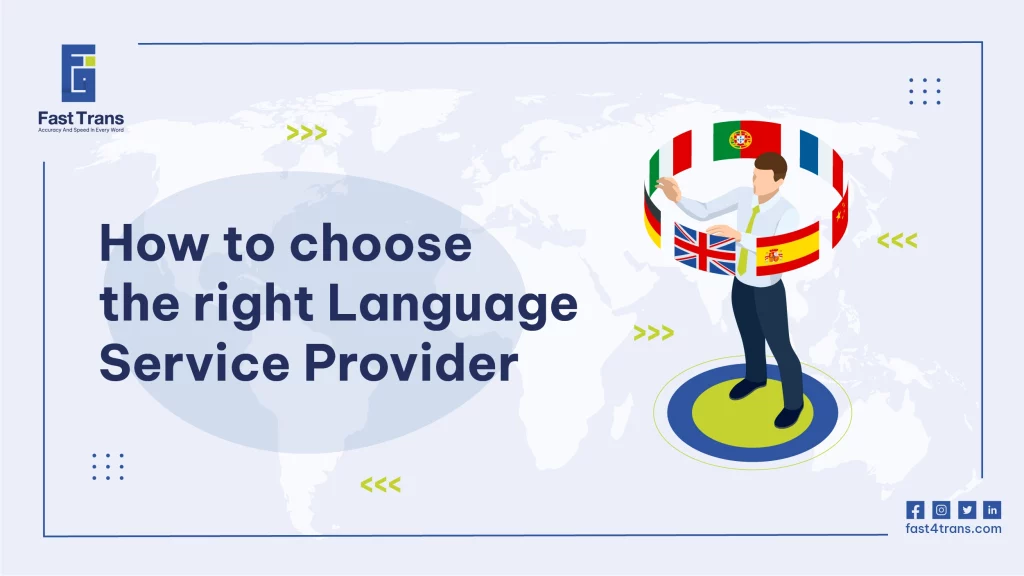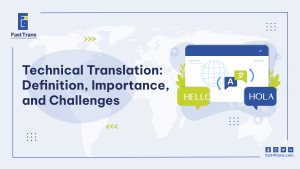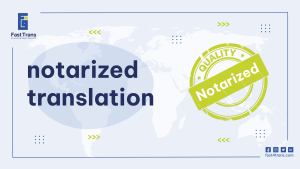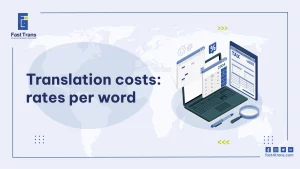A professional Arabic language service provider (LSP) specializes in offering accurate and culturally nuanced linguistic solutions, such as translation, localization, and transcription, tailored to specific industries. They use advanced translation tools and skilled linguists to ensure high-quality, efficient communication across Arabic-speaking markets.
By selecting an experienced LSP, businesses can seamlessly expand their reach while ensuring that translations resonate with local audiences, all while benefiting from transparent pricing and top-notch quality assurance.
What is an Arabic Language Service Provider?
First things first, an LSP is a company or an individual who offers a variety of language-related services.
These services could include but are not limited to (translation (T), Translation-Editing-Proofreading (TEP), localization, copywriting, quality assurance, editing and proofreading, transcreation, transcription, interpreting machine translation, machine translation post-editing (MTPE), translation evaluation…etc)
It involves linguistic, technical, and quality assurance services.
Advantages of a professional Arabic language service provider
A professional Arabic language service provider (LSP) offers expert linguists familiar with cultural nuances, ensuring effective multilingual communication. By leveraging advanced translation technology and managing resources, they save time and effort, providing high-quality, consistent results efficiently.
1. Help of specialized industry experts
What’s better than bringing in experts in your field who are also up to date with cultural nuances?
They help meditate multilingual communication across different language pairs if your business functions in several regions, catering content that resonates with each audience requires linguists who are up to date with cultural aspects during the localization process.
2. Saving effort
Instead of spending time and budget by looking for and hiring freelance translators, who could be unqualified, or with varying expertise, an LSP already has its hands on professional translators who can get the job done, they are a mediator.
You pay the LSP, they find the translators, finish and submit the project for review, and pay their translators.
3. Utilizing Translation Technology
Besides being prepared with trustworthy translators, LSPs integrate translation software like translation management systems. CAT tools like memoQ and Trados, and machine translation.
Translation management systems are crucial for managing and streamlining translation projects, they enable translators, and editors to work simultaneously on the same document, and project managers to supervise project progress, and assign tasks.
Integrating translation software can have a huge impact on productivity, consistency, and accuracy due to fostering powerful translation tools like glossaries, and translation memories which save time, money, and effort.
you might be interested in what is the best translation vendor for you an In-House, Freelance, or Outsource?
10 Tips to Choose a professional Arabic language service provider
To select the right Arabic language service provider, prioritize specialization in your industry, quality assurance, and use of advanced translation tools. Ensure they offer balanced pricing, cultural sensitivity, and a full suite of services to meet your unique business needs.
1. Arabic LSP specialization
Have they worked with your niche before?
Specialization is probably the most important aspect when narrowing down the search for the best LSP for your needs.
If you are a jewelry business, you don’t want to hire an LSP who usually works with medical translation or financial one.
Instead, you need linguists who know the jargon of your business, are aware of the language of your competitors and have demonstrated experience in the field.
They should be familiar with jargon related to jewelry making like manufacturing terms, jewelry polishing machines, the difference between gemstones, and karats, and the tone of language often used with jewelry.
You get the idea…
2. Work Load
After specialization, it’s crucial to address the subject of workload
Is the LSP busy with several projects at the same time? If so, how much work can they deliver in one day or week?
Is there a promised word count?
What about their turnaround rate?
If the workload is overwhelming, you might end up distributing work by hiring more than one LSP, depending on how many languages you are dealing with, or domains of content to be edited or translated.
3. Use of translation software
These days, translation is not just about language expertise, but also mastering technicalities. Your ideal LSP uses technology to provide an easy way of communication.
They are always up to date with better translation software to maximize productivity.
With large projects, an organized LSP will use a reliable translation management system TMS to streamline tasks in one place.
What’s better, having work scattered over emails, excel sheets, and Microsoft Teams groups where things get lost? Or using a TMS that can integrate everything in one cloud space.
4. Quality
The second thing to look for is the quality of service.
Quality involves how the LSP hires its translators. Do they work with highly qualified linguists who have experience in your industry? How do they assure translation quality with freelancers?
What are their means to secure your project data if it has sensitive information like financial ones?
What is the procedure to address issues or complaints?
Each of these questions unveils the process in which the LSP works and will differentiate the organized LSP from its opposite.
Lastly, it’s a good idea to look for its ISO certifications like ISO 9001, and ISO 17100.
read more about the Best localization agency in middle east
5. Credibility
A step further to ensure the quality of your LSP is to ask for reviews and look into referrals.
The reviews could be found on social media, or through networking with companies in your industry. They could involve customer or client reviews, as well as employee reviews.
6. Price
The cheapest LSP is probably not the best decision to make, especially if your expectations of the work quality are demanding.
You’ll need an LSP that’s transparent with pricing, making sure that they know our budget and won’t surprise you with any hidden fees that you were not aware of beforehand.
7. Translation Sample
Can the LSP provide a free sample of translation for their clients as one way of showing credibility for their work?
At Fast Trans, for instance, clients are granted a free translation sample from the selected project to get an idea of what to expect.
It’s a tiny service that earns customer’s trust and keeps them around for future projects.
8. Cultural Sensitivity
This is related to the translator’s specialization and experience.
If they come from different backgrounds, does the LSP provide training or testing to ensure awareness of cultural sensitivities?
If yes, it is a green flag because it shows how the agency is dedicated to delivering localized translations that cater to the different audiences of your business. It stems from their knowledge that missing out on cultural nuances when dealing with the target audience could blow the business.
9. Balanced packages
Last but not least, hiring an LSP is all about seeking a balanced package for your needs. It should deliver the needed quality, at a budget-friendly price.
It’s recommended to avoid fixating on one aspect while leaving out the rest.
There is plenty of fish in the sea even when it comes to language providers, you just need to dig for the suitable one without rushing to compromise.
10. What Other services LSP offer?
Seek a language service provider (LSP) that offers a full suite of services
Needless to say, having a single provider handle all projects fosters familiarity with your company’s needs.
Inquire about other LSP services like Proofreading, Localization, Editing, PEMT, and MTPE, and assess if there are limitations on source file formats.
read more How Do You Create a Translation Services RFP
Checklist to ask to an Arabic language service provider
Let’s recap these 10 points into 10 bulletproof questions to ask the LSP:
1-Do the hired translators have experience in my niche or industry?
2-How much work ‘word count’ can you deliver in one day/week?
3-How often do you utilize translation technology like CAT tools, TMS, and Machine Translation?
4-How do you measure work quality?
5-Is there an ISO certification you can show me? where can I find client referrals who worked with you before?
6-What exactly are the services does the project cost entail?
7-Can you provide a sample for your work as a start?
8-How do you make sure the translators are aware of the target audience’s cultural nuances?
9-What are all of the services you can offer?
10-can they handle all the different file formats I use?
Why choose Fast Trans as a professional Arabic language service provider
Fast Trans is a leading language service provider specializing in professional Arabic language solutions. The company is renowned for its exceptional expertise in offering accurate, high-quality, and culturally nuanced translations across a wide range of industries. Here’s why you should choose Fast Trans for your Arabic language needs:
1. Expertise in Arabic Language and Culture
Fast Trans boasts a team of native Arabic-speaking translators who have an in-depth understanding of both the language and its diverse dialects. They are not only fluent in Arabic but also aware of the cultural nuances that can affect the translation, ensuring that the final product is both linguistically and culturally appropriate.
2. Wide Range of Services
Fast Trans provides a broad spectrum of language services, including certified translations, legal translations, technical translations, and more. Whether you need documents, contracts, marketing materials, or medical reports translated into or from Arabic, Fast Trans ensures accuracy and attention to detail in every project.
3. Professionalism and Quality Assurance
Fast Trans is committed to maintaining the highest standards of professionalism. The company employs a rigorous quality control process, which includes multiple rounds of proofreading and editing to ensure the translation is flawless. Clients can be confident that their Arabic-language projects are handled with the utmost care and precision.
4. Fast Turnaround Time
True to its name, Fast Trans understands the importance of time in business. The company is known for delivering fast and efficient services without compromising on quality. Whether it’s an urgent document translation or a large-scale project, Fast Trans offers timely solutions to meet deadlines.
5. Affordable and Transparent Pricing
Fast Trans offers competitive pricing for its Arabic language services, making it an ideal choice for businesses and individuals who require high-quality translations at reasonable rates. The company provides transparent pricing with no hidden fees, ensuring customers get value for their money.
6. Comprehensive Client Support
Fast Trans is dedicated to offering exceptional customer service. Their team is always ready to assist clients throughout the translation process, answering questions, providing updates, and ensuring that every detail is taken care of. The company’s customer-centric approach builds long-lasting relationships with clients.
7. Experience in Various Industries
Fast Trans has worked with a diverse range of industries, including legal, medical, finance, education, and marketing. This broad industry experience means that Fast Trans is equipped to handle the specialized terminology and complex documents that are often involved in Arabic translation projects.
Whether you’re a business looking to expand into Arabic-speaking markets or an individual needing certified translations, Fast Trans is your trusted partner for professional Arabic language services. With their expertise, dedication to quality, and timely delivery, Fast Trans is the go-to solution for all your Arabic language translation needs.
Conclusion
A professional Arabic language service provider (LSP) is a company or individual that offers specialized linguistic services, focusing on precise and culturally accurate communication across various industries.
These services can include translation, localization, transcription, and interpretation, alongside tools like translation management systems and machine translation. LSPs are crucial for businesses aiming to expand their presence in Arabic-speaking regions, ensuring high-quality and consistent multilingual communication by leveraging the latest technology and skilled linguists.
When selecting an Arabic LSP, it’s essential to prioritize their expertise in specific industries, their use of translation technology, and their commitment to cultural sensitivity. A reputable provider will offer a wide range of services, maintain quality assurance practices, and be transparent with pricing.
By choosing an experienced LSP, companies benefit from efficient and accurate translations that align with their business goals, avoiding potential communication barriers in Arabic markets.










